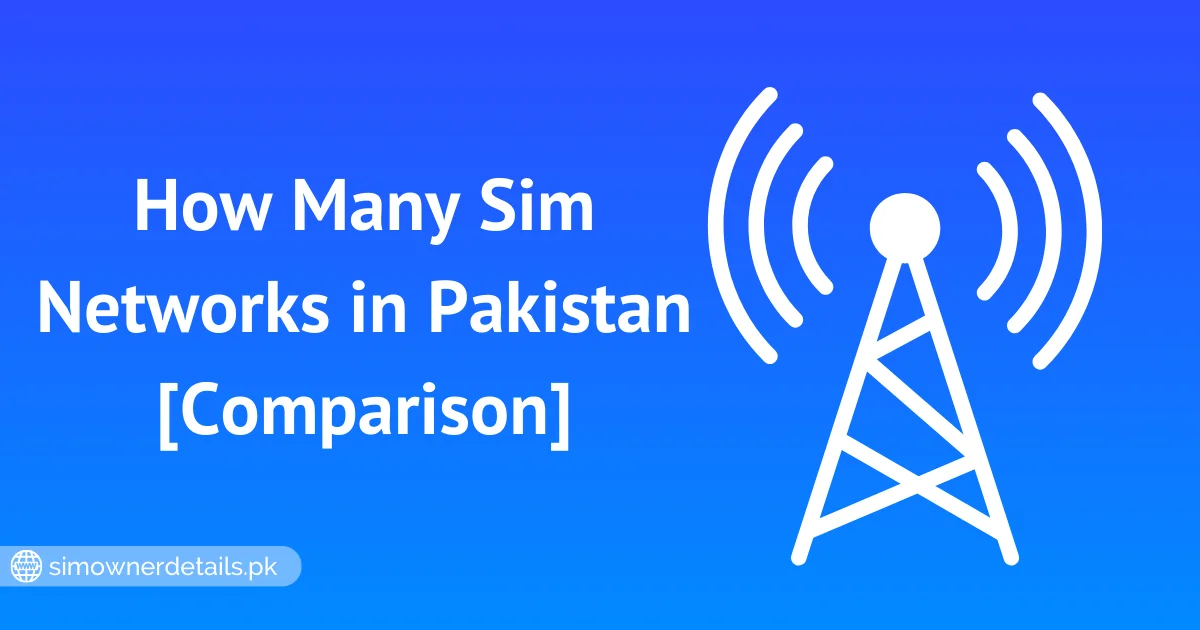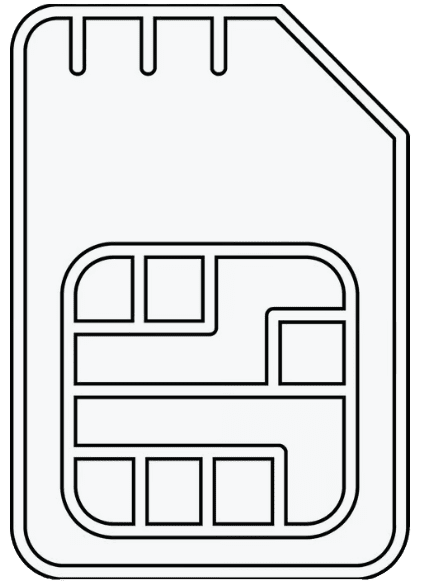Choosing the right SIM network in Pakistan can feel confusing—especially if you’re new to the country or switching providers. This guide keeps it simple. You’ll find how many SIM networks there are, what makes each one different, and how to decide which SIM suits your needs for data, voice, travel, and budget.
Whether you want the widest coverage, faster 4G, or smooth service in the northern areas, you’ll get a clear, up-to-date comparison in plain language.
Quick Answer: How many SIM networks are in Pakistan?
Pakistan has:
- 4 nationwide SIM networks (Mobile Network Operators, or MNOs), and
- 1 regional network (serving Gilgit-Baltistan and Azad Jammu & Kashmir).
The operators are:
- Jazz (Mobilink + Warid)
- Zong (CMPak, owned by China Mobile)
- Telenor Pakistan
- Ufone 4G (part of PTCL Group)
- SCOM (regional: Azad Jammu & Kashmir and Gilgit-Baltistan only)
Tip: MVNOs (virtual operators) are not widely active in Pakistan, so most users choose from the five above.
Pakistan SIM Networks at a Glance
Below is a high-level snapshot to help you compare quickly.
| Operator | Footprint | 4G/Tech | VoLTE | eSIM | Best For | Notable Points |
|---|---|---|---|---|---|---|
| Jazz | Nationwide | 4G widely, 3G phased out in many areas | Yes (device dependent) | Available in major cities | Broad coverage & large user base | Strong on coverage and on‑net community; wide retail presence |
| Zong (CMPak) | Nationwide | Strong 4G with good capacity | Yes | Available | Fast and consistent data | Often praised for data performance; early tech adoption |
| Telenor Pakistan | Nationwide | 4G available; some areas focus on voice reliability | Limited/varies by device and area | Check availability | Reliable voice; good rural reach in many regions | Known for stability; watch for network consolidation news |
| Ufone 4G | Nationwide | 4G improving, upgraded in recent years | Yes (select devices/areas) | Available | Value bundles, call quality | Smaller footprint historically; improving after spectrum investments |
| SCOM (SCO) | AJK & GB (regional only) | 4G in towns/valleys; 2G/3G elsewhere | Limited | Not common | Northern areas coverage | Often the only signal deep in GB/AJK; essential for trekkers |
Notes:
- 5G: As of the latest public updates, Pakistan has run 5G trials, but there is no broad commercial 5G rollout yet. 4G (LTE) is the mainstream data technology.
- Prefixes (like 030x, 031x, etc.) no longer guarantee network identity because of number portability.
Head‑to‑Head Comparison
Coverage and Reliability
- Jazz: Widest overall footprint and strong city plus highway presence. Good “all‑rounder” for most people.
- Zong: Very solid national coverage with a reputation for strong 4G capacity in cities and many towns.
- Telenor: Reliable voice coverage across many rural belts; data speeds vary by locality.
- Ufone: Historically smaller but improving in urban and peri‑urban zones after upgrades.
- SCOM: The go‑to operator for AJK and GB, often the only practical choice in remote valleys.
What this means: If you move around the country a lot, Jazz or Zong are safe bets. If you live in a rural area with a proven Telenor signal, Telenor can be steady for voice. For trips to the north (AJK/GB), carry SCOM.
Data Speeds and Consistency (4G)
- Zong: Frequently rated strong for 4G consistency and capacity in many cities.
- Jazz: Good 4G across a large footprint; performance depends on local load.
- Ufone: 4G speeds improving, especially in upgraded zones.
- Telenor: Steady for basic usage; heavy data users should test locally.
- SCOM: Good where 4G is present; expect variability in remote terrain.
Remember: Speed depends on your exact location, the time of day, local tower capacity, and your phone’s supported bands (commonly LTE bands 3, 1, and 8 in Pakistan).
Call Quality and VoLTE
- VoLTE allows clearer calls over 4G and faster call setup.
- Jazz, Zong, and Ufone: Broad VoLTE support on compatible devices and regions.
- Telenor: VoLTE availability is more limited.
- If crystal‑clear calls matter, check if your handset supports VoLTE and confirm it’s enabled on your chosen network.
Plans, Prices, and Value
- All four nationwide operators offer daily, weekly, and monthly bundles for data, voice, and social apps.
- Jazz/Ufone: Popular value bundles and “on‑net” deals (cheap calls within the same network).
- Zong: Offers competitive data bundles, often attractive to heavy users.
- Telenor: Solid voice-centric packs; data depends on your area.
- Taxes apply to loads/usage (withholding tax and provincial sales tax). Always check the final price in the app or at the franchise.
Because bundle names and prices change frequently, compare live in each operator’s app before you decide.
International Roaming and Travel
- Jazz and Zong: Generally broader roaming partnerships and easy roaming activation.
- Ufone and Telenor: Roaming available; check specific destination countries.
- Tourists and business travelers should activate roaming in advance and confirm rates per country. If you’re staying in Pakistan, a local data bundle is far cheaper than roaming on a foreign SIM.
Apps and Customer Experience
- All major operators offer self‑care apps to:
- Buy/track bundles
- Check usage and taxes
- Manage SIM services
- Jazz World, My Zong, My Telenor, and My Ufone apps are widely used and can save time versus visiting a service center.
Special Case: Northern Areas (AJK & Gilgit‑Baltistan)
If your trip includes Naran, Hunza, Skardu, Fairy Meadows, or trekking routes:
- Get an SCOM SIM. In many remote spots in AJK/GB, it’s the only network with usable signal.
- In larger towns, Zong and Jazz are increasingly present, but for mountains and valleys SCOM is often essential.
- Data can be slow in remote terrain; carry offline maps and keep essential contacts downloaded.
Which SIM Should You Buy? Practical Scenarios
- Heavy data user in cities (streaming, ride‑hailing, maps):
- Zong or Jazz. Test both if possible; Zong often leads for consistent 4G in urban zones.
- Long intercity travel and highways:
- Jazz for breadth, Zong as an alternative. Keep offline navigation ready.
- Rural living, voice reliability a priority:
- Telenor if it has proven local coverage; Jazz otherwise.
- Value seekers on calls + reasonable data:
- Ufone’s bundles are appealing; check coverage where you live.
- Northern areas (AJK/GB) trekking or extended stays:
- SCOM. Consider a second SIM from Jazz/Zong for towns.
- Short visit (tourist/business):
- Jazz or Zong for easy availability, eSIM in major cities, and good city coverage. Add SCOM if heading north.
Pro tip: If your phone is dual‑SIM, run a “coverage SIM” (Jazz/Zong) plus a “local hero” (SCOM for the north, or your friends’ on‑net network for cheap calls).
What to Check Before You Decide
- Coverage where you’ll actually use it:
- Ask neighbors/coworkers, and check official coverage maps.
- Your phone’s compatibility:
- Ensure LTE bands 3 (1800) and 1 (2100) at minimum; Band 8 (900) helps in some areas.
- VoLTE and eSIM:
- If you care about HD calls or want to go eSIM‑only, confirm your device and operator support.
- Bundles you need:
- Social (WhatsApp/YouTube), all‑net minutes, or pure data—compare monthly packs in the app.
- Number portability (MNP):
- You can keep your number and switch networks if you’re unhappy later.
- Taxes and final prices:
- Expect withholding and sales taxes on loads/usage; always view the final amount.
How to Get a SIM in Pakistan (Locals and Visitors)
For Pakistani citizens:
- Bring your original CNIC to an official franchise or authorized retailer.
- Complete biometric verification (fingerprint).
- Choose between prepaid (the most common option) and postpaid, then select your starter bundle.
- Keep your SIM count in check (max 5 voice/data SIMs per CNIC).
For foreign visitors:
- Bring your original passport (and visa if applicable) to an official service center (airport kiosks in major cities or main city franchises).
- Register your SIM with biometric verification.
- Consider eSIM if your phone supports it and the operator offers it in your city.
- If your phone is imported, ensure it’s compliant with PTA’s DIRBS (device registration) to avoid service issues on extended stays.
Useful tips:
- To see how many SIMs are already registered on your CNIC, you can use the PTA SIM check service (code and site vary, ask at the franchise).
- Avoid buying unregistered SIMs from street vendors; stick to official outlets.
Frequently Asked Questions
- Are there 5G services in Pakistan?
- Not commercially at scale yet. Operators have conducted trials. 4G is the primary standard for now.
- Can I keep my number and switch networks?
- Yes, via Mobile Number Portability (MNP). Visit the new operator’s franchise with ID; they’ll handle the porting.
- Do prefixes (030x, 031x, etc.) show the network?
- Not reliably anymore. After MNP, the prefix doesn’t guarantee the current operator.
- Which network is best for gaming?
- It depends on local latency. Zong and Jazz often deliver stable 4G in cities. Test pings at your exact location.
- Which operators support eSIM?
- Jazz, Zong, and Ufone offer eSIM in major cities. Availability can change—confirm at an official center. Telenor availability is limited; check current status.
Original Insights: How to Choose with Confidence
- Do a 24‑hour speed and signal test: If you can, borrow a friend’s SIM (or use dual‑SIM) and run a simple speed test at home, work, and commute times. Consistency beats peak speed.
- Look beyond “unlimited”: Many “unlimited” social bundles throttle after a fair‑use threshold. Read the details in the app.
- VoLTE matters for busy areas: In congested cities, VoLTE often helps with faster call setup and fewer drops.
- For the north, plan redundancy: If your trip includes off‑grid valleys, take SCOM and download offline maps and permits.
Summary Comparison (What Each Does Best)
- Jazz: Best “everywhere” pick with wide coverage and easy availability.
- Zong: Often strongest for 4G data users and consistency in many cities.
- Telenor: Reliable voice in several rural belts; solid for those who value stability more than raw speed.
- Ufone: Good value on calls and improving 4G; worth testing in your area.
- SCOM: Mandatory for serious travel in AJK & GB.
Is It Worth Buying a Local SIM in Pakistan?
Yes, absolutely. A local SIM is the most cost‑effective way to stay connected in Pakistan. For most users:
- Choose Jazz or Zong for balanced coverage and data.
- If you live where Telenor is strong for voice, it’s a steady option.
- Ufone delivers solid value if coverage around you has improved.
- Heading to AJK/GB? Add SCOM.
Final tip: Your location decides the winner. Spend 10 minutes testing coverage and bundle options before you commit, and you’ll save money and avoid headaches later. Click here to view the SIM owner details.


 SIM OWNER DETAILS
SIM OWNER DETAILS